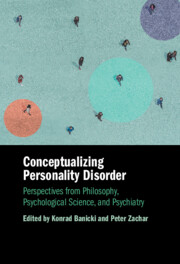 Conceptualizing Personality Disorder
Conceptualizing Personality Disorder Book contents
- Conceptualizing Personality Disorder
- Conceptualizing Personality Disorder
- Copyright page
- Contents
- Figures
- Tables
- Contributors
- Introduction
- Part I Historical Perspectives
- Part II Contemporary Approaches to Traditional Conceptual Perspectives
- Part III Novel Conceptual Approaches to Personality Disorder
- 10 What Does Personality Have to Do with Mental Disorder?
- 11 Self-Illness Ambiguity in Personality Disorders
- 12 On Personality Dimensions and Disorders
- 13 A Dual-Aspect Approach to Personality Disorder
- 14 Network Architectures of Personality and Its Pathology
- 15 From Paul Tillich’s The Courage to Be to Radical Acceptance and Radical Openness
- 16 Personality “Disorder” and the Incapacity to Self-Regulate
- Part IV Exploring Negative Consequences of Diagnosing Personality Disorder
- Part V Perspectives on Borderline and Narcissistic Personality
- Index
- References
15 - From Paul Tillich’s The Courage to Be to Radical Acceptance and Radical Openness
Or Spiritually Based Dialectical Approaches to Neurotic Character
from Part III - Novel Conceptual Approaches to Personality Disorder
Published online by Cambridge University Press: 25 June 2025
- Conceptualizing Personality Disorder
- Conceptualizing Personality Disorder
- Copyright page
- Contents
- Figures
- Tables
- Contributors
- Introduction
- Part I Historical Perspectives
- Part II Contemporary Approaches to Traditional Conceptual Perspectives
- Part III Novel Conceptual Approaches to Personality Disorder
- 10 What Does Personality Have to Do with Mental Disorder?
- 11 Self-Illness Ambiguity in Personality Disorders
- 12 On Personality Dimensions and Disorders
- 13 A Dual-Aspect Approach to Personality Disorder
- 14 Network Architectures of Personality and Its Pathology
- 15 From Paul Tillich’s The Courage to Be to Radical Acceptance and Radical Openness
- 16 Personality “Disorder” and the Incapacity to Self-Regulate
- Part IV Exploring Negative Consequences of Diagnosing Personality Disorder
- Part V Perspectives on Borderline and Narcissistic Personality
- Index
- References
Summary
The courage to be by Paul Tillich is explored with a special emphasis on its dialectical ontology and the account of neurotic character and existential courage informed by it. Then, in turn, two more contemporary and more specifically clinical and secular approaches: dialectical behavior therapy (DBT) of Linehan and radically open dialectical behavior therapy (RO-DBT) of Lynch are analyzed in terms of the dialectical framework they employ to explain both the issues pertinent to personality psychopathology and the remedies required to alleviate them. As soon as the dialectical character of these approaches is elucidated, the ideas of radical acceptance (Linehan) and radical openness (Lynch) are brought to the fore and compared in light of different spiritual perspectives lying behind them: Zen Buddhism and contemplative Christianity for the former and Malâmati Sufism for the latter. Finally, some concluding remarks are made to emphasize the parallel conceptual structures existing in Tillich, Linehan, and Lynch and to make clinical, including nosological, sense of non-trivial differences between DBT and RO-DBT.
Keywords
Information
- Type
- Chapter
- Information
- Conceptualizing Personality DisorderPerspectives from Philosophy, Psychological Science, and Psychiatry, pp. 261 - 276Publisher: Cambridge University PressPrint publication year: 2025